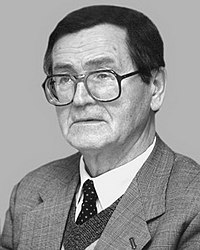Ivan Dziuba
Ivan Dziuba | |
|---|---|
Іван Дзюба | |
 Dziuba in 2004 | |
| Minister of Culture of Ukraine | |
| In office 17 November 1992 – 19 August 1994 | |
| President | Leonid Kravchuk |
| Prime Minister | |
| Preceded by | Larysa Khorolets |
| Succeeded by | Dmytro Ostapenko |
| Personal details | |
| Born | 26 July 1931 Ukrainian SSR, Soviet Union |
| Died | 22 February 2022 (aged 90) Kyiv, Ukraine |
| Awards | Order of Prince Yaroslav the Wise 5th class |
Ivan Mykhailovych Dziuba (Ukrainian: Іва́н Миха́йлович Дзю́ба; 26 July 1931 – 22 February 2022) was a Ukrainian literary critic, social activist, dissident, Hero of Ukraine, academic of National Academy of Sciences of Ukraine, the second Minister of Culture of Ukraine (1992—1994),[1] and head of the committee for Shevchenko National Prize (1999–2001).[2]
He was the Co-Chief of editorial board of the
He was the editor in chief of the magazine The Contemporary (Сучасність) and during the 1990s, a member of the editorial boards of scientific magazines "Київська старовина", "Слово і час", "Євроатлантика" and others.
Biography

Born into a peasant family, until 17 years of age Dziuba spoke only in Russian language.[5]
In 1932, his family, fleeing from the famine, moved from their home village to the nearby workers' village Novotroyits'ke for a short time. Later, they moved to Olenevski Quarry (now Dokuchaievsk), where Dziuba finished secondary school No. 1.
He graduated from Donetsk Pedagogical Institute, and pursued postgraduate studies in the Shevchenko Institute of Literature. His work was first published in 1959.[6]
In the 1970s, he was subjected to political persecutions for the views he expressed in some publications.
In the end of 1965 Dziuba wrote his work
Laureate of the
Dziuba died in Kyiv on 22 February 2022, at the age of 90.[7] In December 2022 a street in Kyiv was named after him.[8]
Awards
- Order of Prince Yaroslav the Wise 5th class (January 22, 2022).[9]
- Order of Liberty (January 16, 2009).[10]
- Hero of Ukraine (July 26, 2001).[11]
See also
References
- ^ a b "In memoriam: Donbas dissident Dziuba, jailed by USSR for challenging Russian imperialism". Euromaidan Press. 23 February 2022. Retrieved 24 February 2022.
- ^ "PREMINUO JE, TRAGEDIJA". espreso.co.rs (in Serbian). Retrieved 24 February 2022.
- ISSN 2707-000X.
- S2CID 254765160.
- Ukrayina Moloda.
- ^ a b "Помер літературознавець і дисидент Іван Дзюба | DW | 22.02.2022". DW.COM (in Ukrainian). Retrieved 24 February 2022.
- ^ "Помер літературознавець, дисидент, Герой України Іван Дзюба". Radio Svoboda. 22 February 2022. Retrieved 22 February 2022.
- Ukrayinska Pravda(in Ukrainian). Retrieved 8 December 2022.
- ^ Decree of the President of Ukraine from 22 січня 2022 year № 27/2022 «Про відзначення державними нагородами України з нагоди Дня Соборності України» (in Ukrainian)
- ^ Decree of the President of Ukraine from 16 січня 2009 year № 26/2009 «Про відзначення державними нагородами України» (in Ukrainian)
- ^ Decree of the President of Ukraine from 26 липня 2001 year № 567/2001 «Про присвоєння звання Герой України» (in Ukrainian)
Further reading
- Шевченківські лауреати. 1962—2001: Енциклопедичний довідник. — К., 2001. — С. 136–138.
Bibliography
- Дисидентський рух в Україні
- Мирослав Попович. Перевідкривач: до 70-річчя Івана Дзюби // Дзеркало тижня
- Юрій Шаповалuk. Досвітній вогонь. У 1965 році з'явився всесвітньо відомий памфлет Івана Дзюби «Інтернаціоналізм чи русифікація?» // Дзеркало тижняuk
- Сюндюков Ігор. Тривожний ювілей. В українському домі відзначали 40-у річницю з часу оприлюднення знаменитої праці Івана Дзюби «Інтернаціоналізм чи русифікація?» // День [permanent dead link]
- Довідник «Хто є хто в Україні». - К.: К.І.С.
- Письменницький довідник // Національна спілка письменників України

